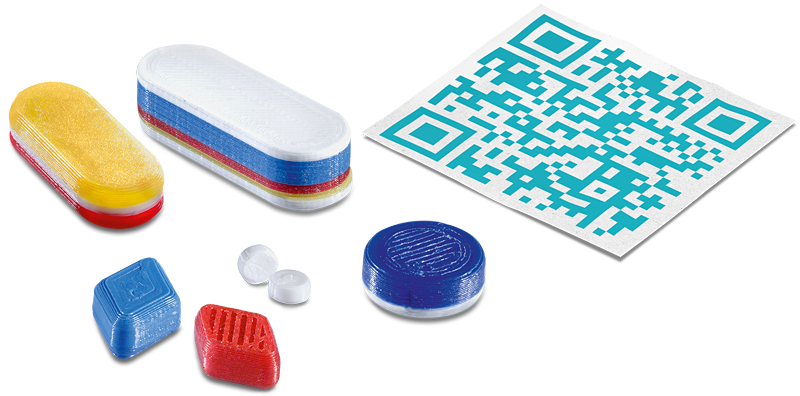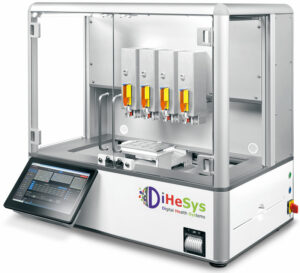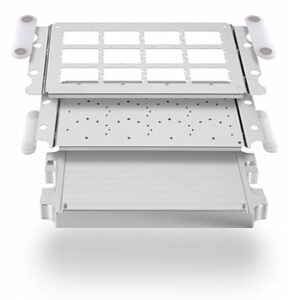Dr. Dachtler, what significance does personalized medicine have for you?
It is estimated that up to 60% of all drugs prescribed today do not achieve the desired therapeutic benefit. With DiHeSys we would like to play a part in changing this situation. Personalized therapies that are tailored to the individual patient enable a more targeted treatment with fewer side effects. For example, the optimal amount of active ingredient strongly depends on body weight. In addition, in Germany alone there are more than 13 million patients who need to take more than three different drugs per day. The elderly are often the ones, who find it difficult to sufficiently control and coordinate multiple drug intake. Therefore, personalized medicine also aims to produce individualized combination products.
Who benefits besides the patients?
Improved treatment success could significantly reduce costs for the health care system. Environmental protection also plays a role, with personalized medicine, only the drugs that are really needed are produced, and in doses that are exactly tailored to the patient. Individual dosing will increase therapeutic success and drastically reduce pharmaceutical waste. Not least, there are also benefits for research: With the printing systems of personalized medicine, clinical studies can be conducted faster and more precisely in the future.

Personalized drugs enable patient-specific dosing and the combination of different active ingredients.
How does DiHeSys contribute to personalized treatment?
Our work focuses on the individualized production of printed drugs. We specialize in the personalized production of thin films for oral intake in 2D printing and tablets in 3D printing. With both dosage forms, we can provide patient-specific dosing and combine several active ingredients in one drug. We offer a complete package that includes printer, formulations and cartridges, but also software and data management.
Did you develop your own hardware?
Together with Harro Höfliger, we are developing the FlexDosePrinter, a printer suitable for the pharmaceutical industry that can produce medicines in 2D and 3D printing. Being able to offer the processes for both methods from a single source is what makes DiHeSys unique: From the formulation development of active ingredient containing inks for 2D printing or filaments for 3D printing to the production of drugs in the FlexDosePrinter, all the way to the supply of consumables such as cartridges.
Can you explain the printing of thin films in more detail?
During this process, so-called ODFs are produced, short for “Oral Dispersible Films”. The basis are placebo carriers, on which we print an active ingredient solution exactly in the quantity required by the respective patient. Inside the printer is a heating plate: After printing, it ensures that the solvent evaporates, and the active ingredient remains. This method is particularly suited for low-dose drugs, such as hormones or certain cytostatic drugs.
You mentioned pharmaceutical 3D printing; how does it work?
BU
With 3D printing, personalized tablets can be produced in any shape. The basis are printable, well-tolerated polymer filaments with the embedded active ingredient. As with thin films, we print the tablet from these polymers with exactly the amount of active ingredient required by the patient. Also larger quantities of active ingredients can be processed because we only need very few excipients. In addition, it is possible to combine several active ingredients in one tablet by printing them in different layers, or to adjust the release of active ingredients from the tablet to the individual needs of the patient.
What role does data management play for DiHeSys?
We are currently working on solutions where we use anonymized treatment data for personalized medicine. Our goal: After entering patient data such as weight, height and, if possible, lifestyle habits, medicines can be produced with the FlexDosePrinter. Drugs could then be printed directly in hospitals or pharmacies. Access to databases and being able to draw on experiences from past therapies offer great opportunities to find the best treatment options. By the way, data already plays an enormous role in medicine today. For example, computers in the field of differential diagnosis help to find the best possible therapies.
Why did you choose Harro Höfliger as a partner for the FlexDosePrinter?

The FlexDosePrinter is suitable for the production of personalized thin films and tablets.
With our plan to build pharmaceutical printers for personalized medicines, we entered unchartered territory. As Managing Director of Gen-Plus in Munich, an innovative high-tech pharmaceutical development laboratory, I already know Harro Höfliger as a future-oriented specialty machine manufacturer who is capable of developing the ideal solutions for our requirements. For example, we already jointly developed a machine with an integrated printing unit for the manufacture of personalized thin films. In addition, we knew that the company had the necessary experience in the field of personalized medicine, for example in the exact dosing of microtablets. Their focus on systems for pharmaceutical and medical technology applications also convinced us. This has made it possible for us to meet the high demands of the medical pharmaceutical industry; at the same time, the compact printers fit on any table. With their pharmaceutical expertise and personal and visionary approach, Harro Höfliger has proven to be the ideal partner for the development of the FlexDosePrinter.
What does the future hold in store?
The future of personalized medicine is definitely exciting. At DiHeSys we are currently working on innovative drug delivery systems: Tablets containing various controlled-release active substances. Each active ingredient is released and absorbed exactly where it is needed most in the body – of course tailored to the individual patient.
About DiHeSys

DiHeSys is an innovative, digital healthcare provider. The company develops and manufactures information and process engineering systems to provide patients with access to personalized medicines.
The products and services optimize the drug supply of patients in all areas (prevention, diagnostics, treatment and therapeutic success). With the FlexDosePrinter, DiHeSys offers its customers a manufacturing system for individualized medicine in 2D and 3D printing, from printable drug formulations to the production of personalized medicines.
Download this article as PDF file
Photos: DiHeSys, Helmar Lünig

